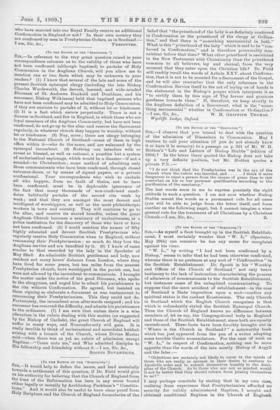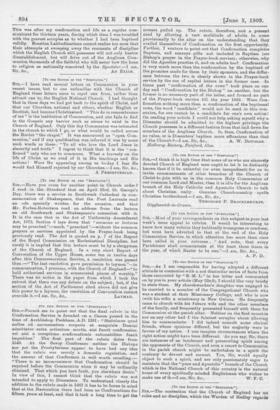[To THE EDITOR OF THE " SPECTATOR.1 SIR,—As myself a
Scot brought up in the Scottish Establish- ment, I most certainly wonder that " W. L." (Spectator, May 29th) can conceive be has any cause for complaint
against his vicar.
"W. L.," by writing "I had not been confirmed by a Bishop," seems to infer that he had been otherwise confirmed, whereas there is no pretence at any sort of "Confirmation "in the Scottish Establishment, Dr. Sprott in his "Worship and Offices of the Church of Scotland" not only bears testimony to the lack of instruction characterising the process of admission of communicants to the Scottish Establishment, but instances cases of the unbaptised communicating. To suppose that the mere accident of establishment—in the case of Seotland a State imposition upon a sect—confers any spiritual status is the rankest Erastianism. The only Church hi Scotland which the English Church recognises is that which is redundantly styled the Scottish Episcopal Church. Thus the Church of England knows no difference between members of, let us say, the Congregational body in England and those of the Scottish Establishment, since both are equally unconfirmed. These facts have been forcibly brought out in "Where is the Church in Scotland F" a noteworthy book which has just appeared from the pen of a writer adopting some terrible Gaelic nomenclature. For the case of such as "W. L.," in respect of Confirmation, nothing can be more apposite than the words of the late saintly Bishop of Argyll and the Isles :—
"Objections are certainly not likely to occur in the minds of those who arc really in earnest in their desire to conform to Apostolic order and to submit themselves humbly to tho disci- pline of the Church. As to those who are not so minded, would it not be better that they should refrain from joining themselves to us?"
I may perhaps conclude by stating that in my own case, realising from experience that Presbyterianism afforded no security for validly administered Baptism, I sought and obtained conditional Baptism in the Church of England.
This was after my confirmation and life as a regular coin- municant for thirteen years, during which time I was troubled with the gravest scruples as to whether I had been baptised
Erastian Latitudinarians cannot realise too soon that their attempts at sweeping away the remnants of discipline which the English Church still possesses will not only hasten disestablishment, but will drive out of the Anglican Com- munion thousands of the faithful who will never bow the knee to religion as nationally conceived by the Spectator.—I am,











































 Previous page
Previous page